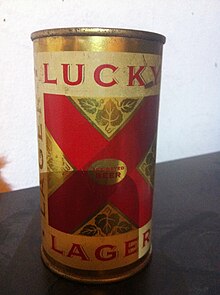Lucky Lager
 Lucky Lager
Lucky LagerLucky Lager is an American lager with U.S. brewing and distribution rights held by the Pabst Brewing Company, and Canadian brand ownership held by Labatt Brewing, which is now part of AB Inbev. Originally launched in 1934 by the San Francisco-based General Brewing Company, Lucky Lager grew to be one of the prominent beers of the West during the 1950s and 1960s.
The General Brewing Company was founded in San Francisco, California by Eugene Selvage (who would remain owner and CEO until 1961).[1][2][3] Eugene teamed up with Paul C. von Gontard, a grandson of Aldophus Busch, and German brewmaster Julius Kerber, to launch a state of the art brewery that could brew beer that rivaled those made in Europe. Lucky Lager, the first beer of General Brewing Company, was commercially introduced in 1934. That same year, General Brewing Company also formed a strategic partnership with Coast Breweries in Vancouver Island, British Columbia as part of a consortium of several Canadian breweries. The General Brewing company expanded and opened Lucky Lager Brewing Company, a second brewery in Azusa, California in 1949. Later in the 50s and 60s, the expansion also reached Vancouver (WA) and Salt Lake City (UT).
Lucky Lager was launched in San Francisco via a series of newspaper ads, billboards, and advertisements on street cars. The ads announced Lucky would be a beer of high quality and would follow the tradition of German beers - being made with high quality ingredients, in a high quality brewery, and with thorough aging. It was launched to significant fanfare and grew steadily, becoming the #2 selling beer in California by 1937. Starting in 1935, Lucky encouraged people to take the taste test and that they would choose Lucky.
The General Brewing Company invested $1,000,000 to open its first brewery in San Francisco. It was planned and designed by Frederick H. Meyer, San Francisco architect, in partnership with George L. Lehle, a brewery engineer from Chicago. This construction was the most modern brewery of its time, with a capacity of 100,000 barrels per year and capabilities of doubling production. By brewing just Lucky Lager, the General Brewing Company achieved a record of selling its entire daily production since the beginning of operations. The main reason for its success with consumers was the high beer quality, which came from the aging the beer adequately unlike many of its post-Prohibition competitors of the time. Moreover, the production was set up in a way that no hands touched the beer or its container until the final step (bottling). In that sense, General Brewing Company posted a bond of $1,000 as a guarantee that the age-date of the beer was authentic.
After WWII, General Brewing began rapid expansion to meet increasing demand. This included expanding into Azusa, California in 1949, Vancouver, Washington in 1950, and Salt Lake City, Utah in 1960.
The following decade, from 1950-1960 saw Lucky Lager grow to be the sales leader in the entire West.[1] This was coupled with continued distribution expansion in an effort to saturate the western market. By 1962, Lucky Lager was producing and selling over two million barrels of beer per year.
...
Wikipedia